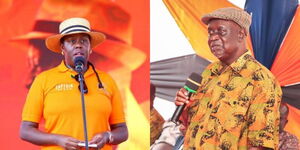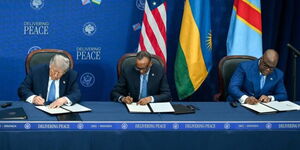The delayed reconstitution of the Independent Electoral and Boundaries Commission (IEBC) has sparked fresh concerns over electoral boundaries review, raising fears that the country may not be able to create new constituencies before the 2027 general election.
During a mid-term retreat for Members of Parliament in Naivasha, National Assembly Speaker Moses Wetang’ula warned that the delay in appointing new IEBC commissioners could derail the boundary review process, which was last conducted in 2012.
“The delay in the reconstitution of the IEBC has stalled crucial activities, including boundary delimitation, which is vital for the country’s electoral system, as well as the timely conducting of by-elections in constituencies and wards that have experienced vacancies,” stated Wetang’ula.
The Constitution mandates that IEBC review constituency boundaries every eight to twelve years, with changes required to be completed at least a year before a general election. However, with less than three years remaining before the 2027 polls, time is running out for any meaningful adjustments.
According to Article 89 of the Constitution, Kenya is divided into 290 constituencies for parliamentary representation. Any changes to these boundaries must align with demographic shifts and population density. Wetang’ula acknowledged the difficulties posed by the prolonged delay in reconstituting the commission, stating that the chances of increasing constituencies were now slim.
“It is indeed true that due to the delay in the reconstitution of the IEBC, we have lost a lot of time because of being embroiled in court cases. We do not know whether there will be a possibility for boundary delimitation once the new commissioners assume office,” he added.
Majority Leader Kimani Ichung’wah also voiced concerns over the matter, calling for transparency in appointing new commissioners. He warned that prolonged inaction would leave several regions under-represented and make future elections more contentious.
“We must ensure that those selected to join the IEBC are individuals of integrity who can restore public trust in the commission. The selection panel must act swiftly and transparently,” said Ichung’wah.
Opposition leaders have been vocal in demanding the swift reconstitution of the commission, citing the urgent need for electoral reforms. Since the departure of former IEBC Chairman Wafula Chebukati and his commissioners in early 2023, the electoral body has been left under the leadership of its secretariat, which lacks the authority to oversee boundary reviews or by-elections.
Wetang’ula urged MPs to support the IEBC once new commissioners assume office, stressing the importance of a fully functional commission in ensuring fair representation.
“The importance of having a fully constituted commission cannot be overstated, as it directly affects the conduct of elections and the accuracy of electoral boundaries, which are crucial for fair representation in Parliament,” he said.
With the IEBC selection panel now operational, expectations are high that new commissioners will be in place within the next three months.












